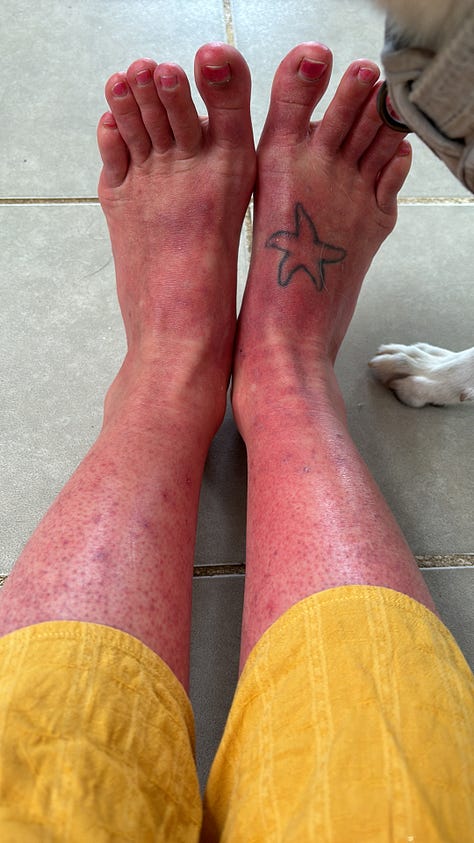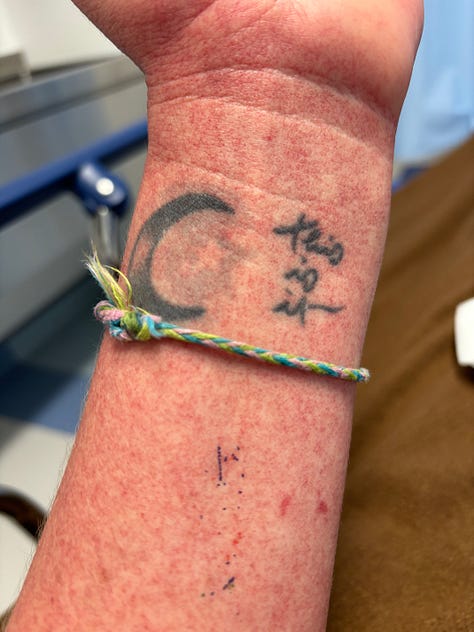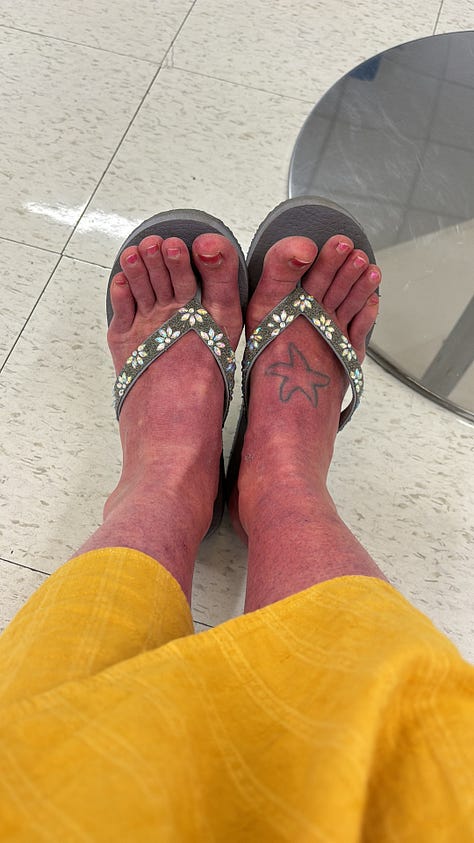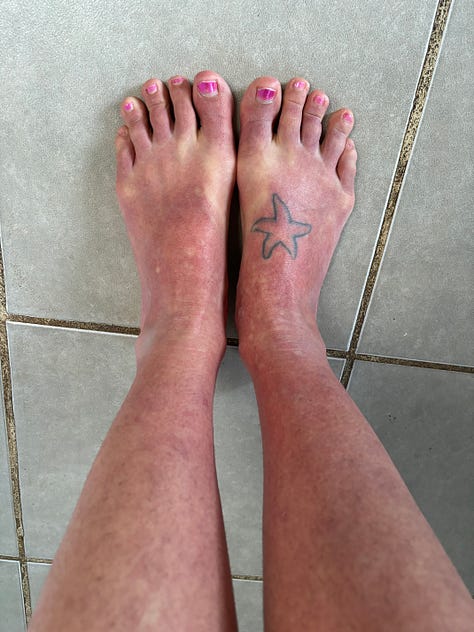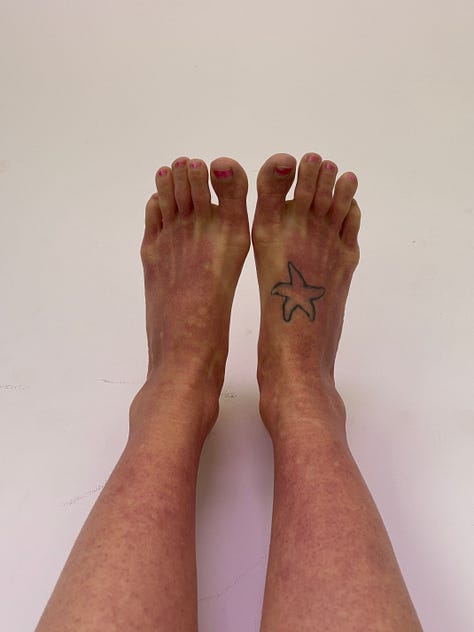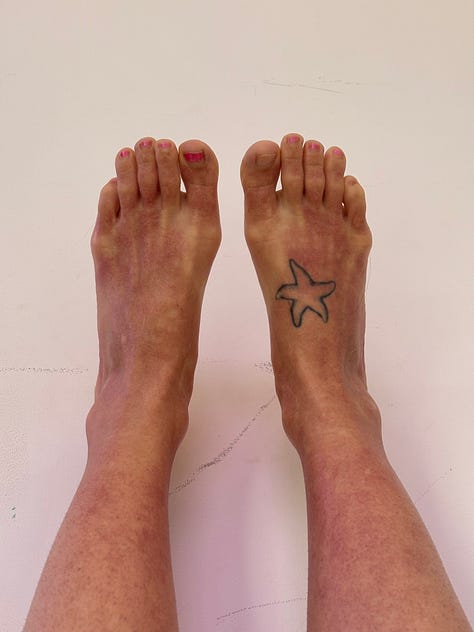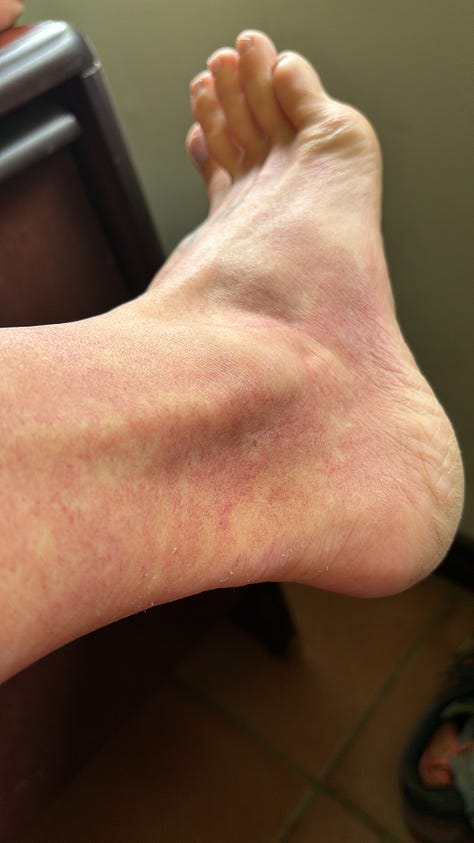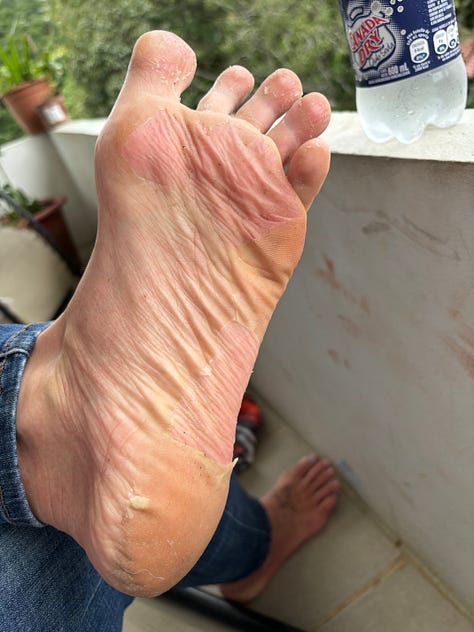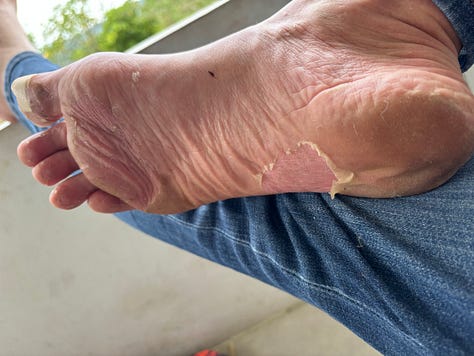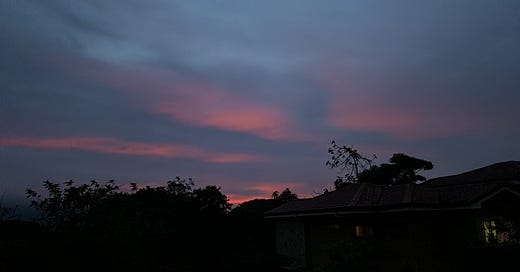Dear friends,
The dengue diaries continue…
It has been over three weeks and I am still very much recovering from/thinking-with/being-with dengue. My thinking feels fragmented, like I keep losing the plot mid-sentence. I am writing with dengue - my co-author today, if you will. I invite you to read with us, to know that dengue is sitting here with me, in me, as I write.
There are traces of dengue on and in my body: a light dusting of rash residue left on my feet, a space in my head where dengue has carved me out, a faint memory of the pain behind my eyes. And the peeling, which I will get to later…
It has been a wild and interesting to watch and feel the rash drain from my body (I will include a photo gallery at the end of the post for the curious - and an attempt to spare those of you who might not want to look). For about two days, it covered my whole body, then slowly dissipated through my limbs. It has been flowing out of me into the earth through my feet and hands. Slowly, slowly, the color has been fading, first from my shins, then through my lower legs. Now there are just light traces on my feet, but still traces, letting me know that my body is still healing.
Where the rash was, my skin is now peeling on my hands and soles of my feet.
I am in the season of shedding my skin. Literally.
On a recent episode of Moonbeaming, one of my favorite1 podcasts, guest Eli Lawliet, Ph.D. aka the Gender Doula, shared about snake medicine2 and what we can learn from snakes and particularly their process of shedding. He has pet snakes, and he talked about how snakes can have an easy shed or a hard shed, and how the timing has to be just right for shedding and this impacts how easy or hard the shed is. On an easy shed, the skin comes in one whole piece, and a hard shed will come off in pieces, causing discomfort. My experience feels more like the latter.
We are always shedding skin - literally constantly - but I am shedding in huge chunks and layers. I am getting entirely new skin on my hands and soles of my feet, very sensitive parts of the body, where we feel and make contact with the world, the thin barrier between us. The shedding has been different on the hands, which came off in multiple thin layers, compared to the feet, which has come off in big, thick chunks. The soles of my feet are raw, pink like a newborn baby’s.
It is tender. Uncomfortable. Sensitive. I want to say pain, because all of my nerve endings are being activated in a way they probably haven’t been since I took my first steps. But it isn’t quite pain.
It feels like an initiation.
To be in my body right now is to feel acutely. Even the tips of my fingers as I write this feel more than they normally would as I type. It is a heightened sensitivity and tenderness due to the freshness. It necessitates gentleness.
Things hurt that normally wouldn’t: holding my dog’s leash, opening a bottle or jar, a light bump feels excruciating. It also brings a new level of awareness: of the shocking coolness of the water as I wash my hands, of every tiny pebble I step on.
To feel acutely is exhausting, so much information via sensation coming into the nervous system.
This sensitivity isn’t just physical - it is emotional as well. Another interesting side effect of dengue is depression, but the relationship between them is poorly understood. While I wouldn’t say I am depressed, I will say that dengue has put me in close touch with my sadness. I can’t help but think this is connected to the overall sensitivity, feeling more, in all ways, which makes sense - we are thinking-feeling creatures, and our bodies and emotions are deeply interconnected, the reality of interbeing. But I also know joy and sadness inter-are, and I sense this sadness will also, eventually, put me in touch with joy, and yet I need to let it be and let the process run its course.
Sadness, I know you are here and I am here for you.
My teacher Bayo Akomolafe talks about how, in these times, we are being invited to lose form. He asks, “How do we fall apart together?” In this moment in which I am falling apart and losing form, I am asking myself: what is the lesson here? What is this initiation revealing? What is dengue, my new teacher, trying to teach me?
Slow down. Even more.
Rest more than you think you need to. Then rest more.
Test your limits and you still might go beyond them accidentally.
Forgive yourself when you do.
You can’t rush your healing.
It makes me think about how difficult our world is for sensitive people. How we all have to build up thick skin to live in this world which is at times so harsh and hard. How maybe these times requires us to shed, and through that shedding, we may uncover new skin, new sensations, new sensibilities. That the process is uncomfortable and certain things might feel painful, but it might help us feel again, which is maybe what we most desperately need.
It is essential that we not lose our sensitivity. It is essential that we create a world that is more gentle, more tender.
The shedding is cleaning my slate, giving me a new barrier to the outside world. My body, in a way, is beginning again.
I was asked this week why it was taking me so long to heal from dengue (side note: this is perhaps never a helpful question to ask a sick person). But the short answer would probably be this: it is taking me longer to heal because I can’t take care of myself as much as I would like to because of current life circumstances - because I am a solo parent.
I am taking care as well as I possibly can. There is not much you can do for dengue beyond rest and drink water. I got some supportive supplements from the local macrobiotic shop- what my grandmother takes, the woman told me. I have been resting and putting my feet up as much as I possibly can.
But the reality of being the solo parent of an active 6-year old is: I can really only rest so much. Somebody has to do the dishes, do school drop-off and pick-up, feed us. I am trying to take care of myself while taking care of both of us, and this is one of the greatest challenges I have encountered as a parent (and specifically a solo parent). When you are sick, there is only so much you can not do. There is only so much you can rest.
Someone might ask, “Why don’t you just ask for more help or hire someone?” But all of this takes energy, too. It requires bandwidth that someone who is ill (or just busy, even) doesn’t have. Asking for help, or hiring help, takes energy, that is not available at the moment, and is even challenging to find when one is totally healthy.
And yet - I am thinking about how I was lucky this happened while I wasn’t teaching and could work from home. I am lucky I have a job with relative flexibility. Others wouldn’t be so fortunate, would have to rest even less or risk losing their jobs.
This is not personal - it ties back to systems: to the ways care is and is not available, and the way care falls on women, queer and non-binary people (I don’t think it lands on cishetero men the same way). The way care work is undervalued, underpaid3. The way our jobs do not allow for sufficient rest and recovery. If we lived in villages, other village members might step in. She could go play in the house next door while I put my feet up. But this is not how things are currently designed, and it is not a personal flaw or responsibility - it is systemic, structural, collective.
I wish so deeply for us a world with more care. A world where it’s easier to be tender, gentle. A world that can hold our sensitivity. A world that makes space for our softness, our healing. A world where we can give and receive care more easily, collectively, reciprocally.
This week, we begin again on campus. It is the start of the academic year.
We start fresh. I start with fresh, tender skin. The students arrive with fresh energy.
Beginnings are important, and beginnings are tender. The gardeners among us will know that seedlings are delicate, the freshness and newness of life needing extra care, attention, protection.
I am starting my third year at UPEACE, which feels wild. How could I have been here that long already? I went to my office this week for the first time since before my trip. As I stood in my office, these words poured through me:
I dedicate myself to cultivating and practicing peace, love, joy, and magic in this space. May it permeate outwards and beyond.
I celebrate multiple new year’s throughout the year: the calendar year Dec. 31/January 1, the astrological new year of the spring equinox, my birthday - a personal new year - and now the start of the academic year. I celebrate this fresh beginning with tenderness. We will honor it at the pedestal altar, with a ceremony of letting go, releasing, and intention setting.
I love writing these missives/essays/love letters to you. Writing for me is transformative and healing. Thanks for being here, seriously. I love you!
In the spirit of writing as healing, here are some questions inspired by today’s post that you might consider pondering or journaling about:
What are you shedding right now? How is that process going for you?
What does it mean to return, changed?
How do you honor the tenderness of new beginnings?
What are you dedicating yourself to in this season of life? What are you practicing?
Wishing more gentle worlds for all of us that can hold us in our tenderness.
Wishing you shedding of what you need to release, and gentleness amidst the shedding.
Wishing us worlds where we can care easily, for ourselves and each other.
Happy full moon eve!
With infinite love and care,
Stephanie
( + dengue)
P.S. One of my favorite bands in the universe across space and time, Blind Pilot, released a new album this week for the first time in about eight years. Their music nourishes me so much, and I encourage you to check it out. It is beyond beautiful and is bringing me a lot of joy. Check it out!
For more of my favorites, see my thinking-with page:
I signed up for the Gender Doula’s snake medicine course which starts in September. It feels too timely given my current shedding journey. Join me! Courses are better when you take them with friends :) https://payhip.com/order?link=HhpUS&pricing_plan=91zwJryRWL
Scene on Radio’s first episode for its new season on Capitalism touches upon this.
